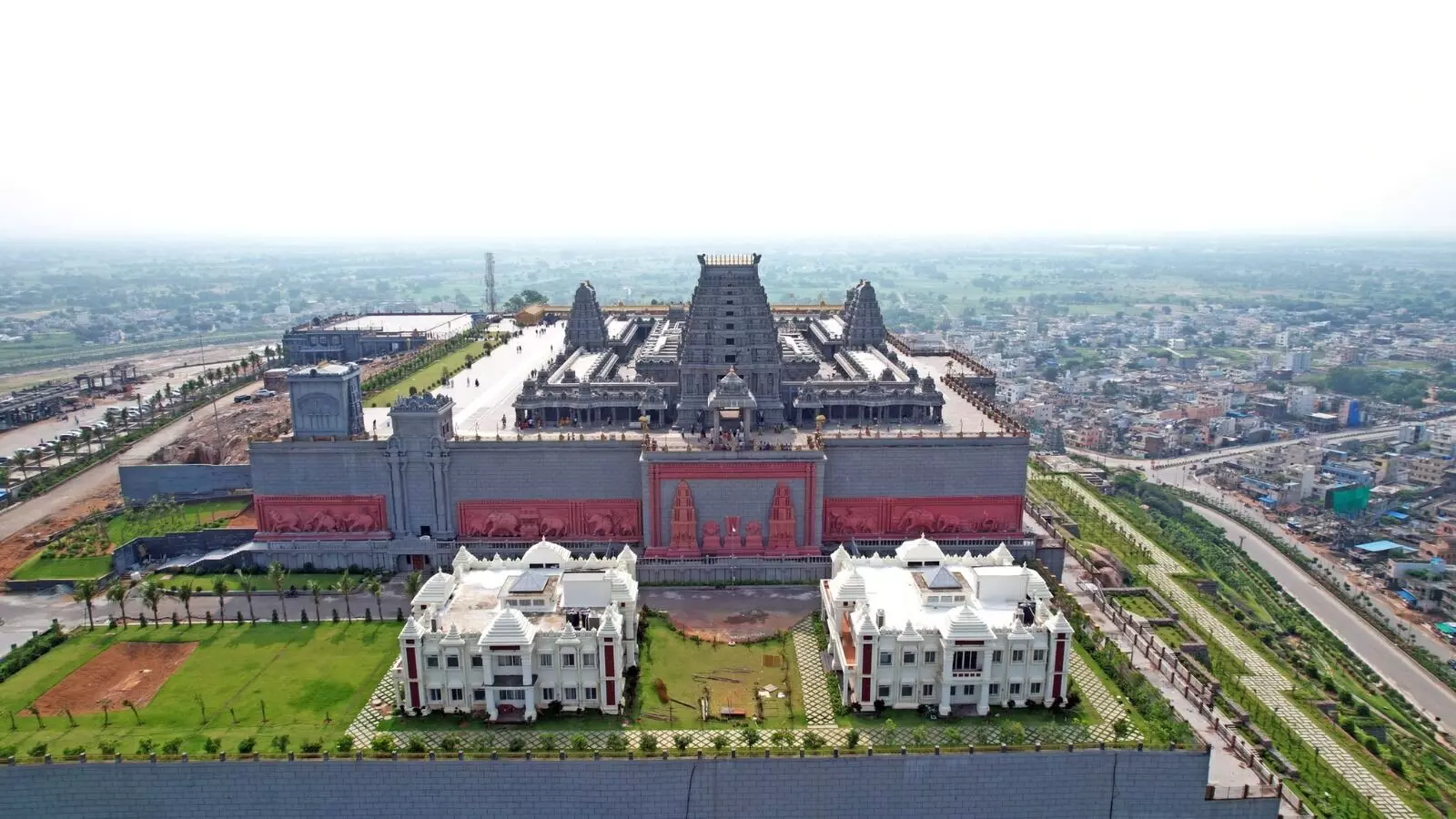10 Years of Telangana: KCR regime’s perennial endeavour for religious welfare, inclusive development
Telangana Government, under the leadership of KCR, has implemented a series of initiatives and programmes aimed at uplifting and empowering diverse religious communities

HYDERABAD: In a remarkable display of commitment to religious harmony and inclusive development, the Telangana Government, under the leadership of Chief Minister K Chandrashekar Rao (KCR), has implemented a series of initiatives and programmes aimed at uplifting and empowering diverse religious communities in the state. With the State Government laying emphasis on preserving cultural heritage, promoting education, facilitating pilgrimage and supporting all communities, its efforts in this direction have garnered widespread appreciation and admiration. Here are the multifaceted programmes undertaken by the KCR regime, to ensure the welfare and progress of people following all faiths in the state.
Welfare of Hindus
Previously, a total of 1,805 temples received a monthly remuneration of only Rs 2,500 in the erstwhile undivided State. With the formation of Telangana, this scheme was extended to an additional 1,840 temples, bringing its total number covered under the programme to 3,645. The monthly remuneration amount was increased to Rs 6,000, with Rs 4,000 allocated for the salary of Archakas (priests) and Rs 2,000 for organising the Dhoopa Deepa Naivedhyam (ritual offering of incense and lamps). This amounts to an annual expenditure of Rs 26.25 crores.
The government has issued notifications to consider sanctioning of the Naivadyam scheme for an additional 1,160 temples located in rural and remote areas – 736 of those temples located in GHMC areas and 1,000 temples in rural areas. The applications for these schemes are currently under verification.
Common Good Fund
The Endowments Department also implements the Common Good Fund Scheme, which focuses on the establishment and maintenance of veda patashalas (schools for Vedic studies) and the construction, renovation, preservation, and maintenance of temples, kalyana mandapams besides charitable institutions. So far, 1,805 works have been sanctioned under the scheme, with an expenditure of Rs 82.48 crore for completed works and ongoing works amounting to Rs 137.75 crore. An estimated expenditure of Rs 193.15 crore is allocated for the remaining 960 works.
Bonalu Festival
In 2014, Bonalu was declared as the State festival of Telangana. A budget of Rs 15 crore was sanctioned for the conduct of the Bonalu festival in various temples of the Goddess in the twin cities and Ranga Reddy district in July and August.
To enhance convenience for devotees, the endowments department has introduced online booking for temple services and mobile services for booking pujas/sevas and accommodations in 36 major temples. Additionally, an agreement has been made with the postal department to allow booking facilities for puja and seva from any post office in the country.
Brahmin Parishad
Since its inception, the Brahmin Parishad has implemented several schemes for the welfare of the Brahmin community, such as the Brahmin Sadan Scheme where a magnificent Brahmin Sadan Complex has been constructed in over six acres at a cost of Rs 12.45 crore. The Government has allotted this land at Gopanpally village in Ranga Reddy and the building is ready for inauguration. A similar Brahmin Sadan is proposed to be constructed in Suryapet, Khammam, Madhira, Peddapalli and Beechupally.
Some of the other notable schemes for the Hindus include Vivekananda Overseas Education Scheme, Brahmin Entrepreneurial Scheme of Telangana (BEST) Scheme, Sri Ramanuja Scheme, Grant to Veda Patashala Scheme, Vedic Students Scheme and Veda/Shastra Pandits Honorarium Scheme.
Welfare of Muslims
The Telangana Government has implemented various schemes focusing on educational development, social and economic progress besides preserving traditions and beliefs of minorities. Official celebrations of Ramadan and Christmas are organised and the government has established Minority Gurukuls, providing residential educational institutions for the minority students. Under the Chief Minister's Foreign Education Scholarship Scheme, deserving minority students pursuing higher education abroad receive a grant of Rs 20 lakh. The Telangana Government has also taken significant steps to preserve and enhance the spiritual heritage of the State. The administration and supervision of the historic Mecca Masjid, which is over 400 years old, now falls under the control of the Government. To ensure its conservation and improvement, an amount of Rs 8.48 crore was sanctioned for repairs, restoration and improvement of amenities.
Similarly, the comprehensive development of Dargah Jahangir Peeran (Rh) at Kothur is underway, with acquisition of land worth Rs 50 crores currently in progress. These initiatives reflect the Government's dedication to preserving religious sites of historical and cultural significance.
Empowering Communities
The Telangana Government recognises the importance of education and empowerment for the overall development of communities. To this end, it has sanctioned funds for the construction of educational institutions and empowerment centres in specific religious premises. For instance, an amount of Rs 20 crores was allocated for the construction of a high school, junior college, and a women empowerment centre on the premises of Barhana Shah Sahib Qibla (Rh.) at Riyasatnagar in Hyderabad. This initiative aims to provide educational opportunities and empower women in the community.
Additionally, the Telangana Islamic Cultural Convention Centre at Kokapet, Hyderabad, received a sanction of Rs 40 crore for its development. This centre will serve as a hub for cultural activities and community events, fostering social cohesion and inclusivity.
Facilitating pilgrimage and connectivity
The Telangana Government recognizes the significance of pilgrimage for various religious communities and has taken steps to facilitate the smooth travel and stay of pilgrims. The construction of a Rubaat-cum-Facilitation Centre at Ajmer, Rajasthan, is one such endeavour. The government has completed the land alienation process and submitted the construction plan to the Ajmer Development Authority for approval. Once completed, this centre will benefit Telangana pilgrims visiting Ajmer.
Protecting Waqf properties and ensuring transparency
To safeguard the interests of Waqf properties, the Telangana Government has implemented measures for their proper registration and management. A Government Order was issued to prohibit the registration of such properties under specific sections of the Registration Act, thereby ensuring their protection and preventing unauthorised transactions. This step promotes transparency and ensures the preservation of waqf properties across the state.
Supporting minority communities
The Telangana Government has also prioritized the welfare of minority communities, including Christians. The government officially celebrates Christmas, distributing clothes to economically disadvantaged Christian families. Over 8.35 lakh Christians receive Christmas clothing, including shirts, trousers, sarees and dress materials.
Under the Driver Empowerment Scheme, the Christian Minority Finance Corporation provides support to unemployed Christian youth. Through this scheme, cars are provided with a 60 percent subsidy for travel and cab services, empowering individuals to pursue self-employment opportunities.
Investing in infrastructure and development
The Telangana Government is dedicated to the development of churches and graveyards, providing substantial funds for their improvement. The construction of Christian Bhawan in Uppal Bhagayat, covering two acres of land, exemplifies the government's commitment to enhancing community infrastructure. With an allocation of Rs 10 crore, this building aims to promote Christian self-respect and serve as a cultural centre.
The Telangana Government's efforts towards religious welfare and inclusive development demonstrate a commitment to preserving cultural heritage, empowering minority communities and fostering social harmony. Through initiatives focused on spiritual preservation, education, pilgrimage facilitation and support for all communities, the Government has set a positive precedent for fostering a diverse and inclusive society. These programmes reflect the Government's dedication to holistic development and the well-being of all religious communities in Telangana.



